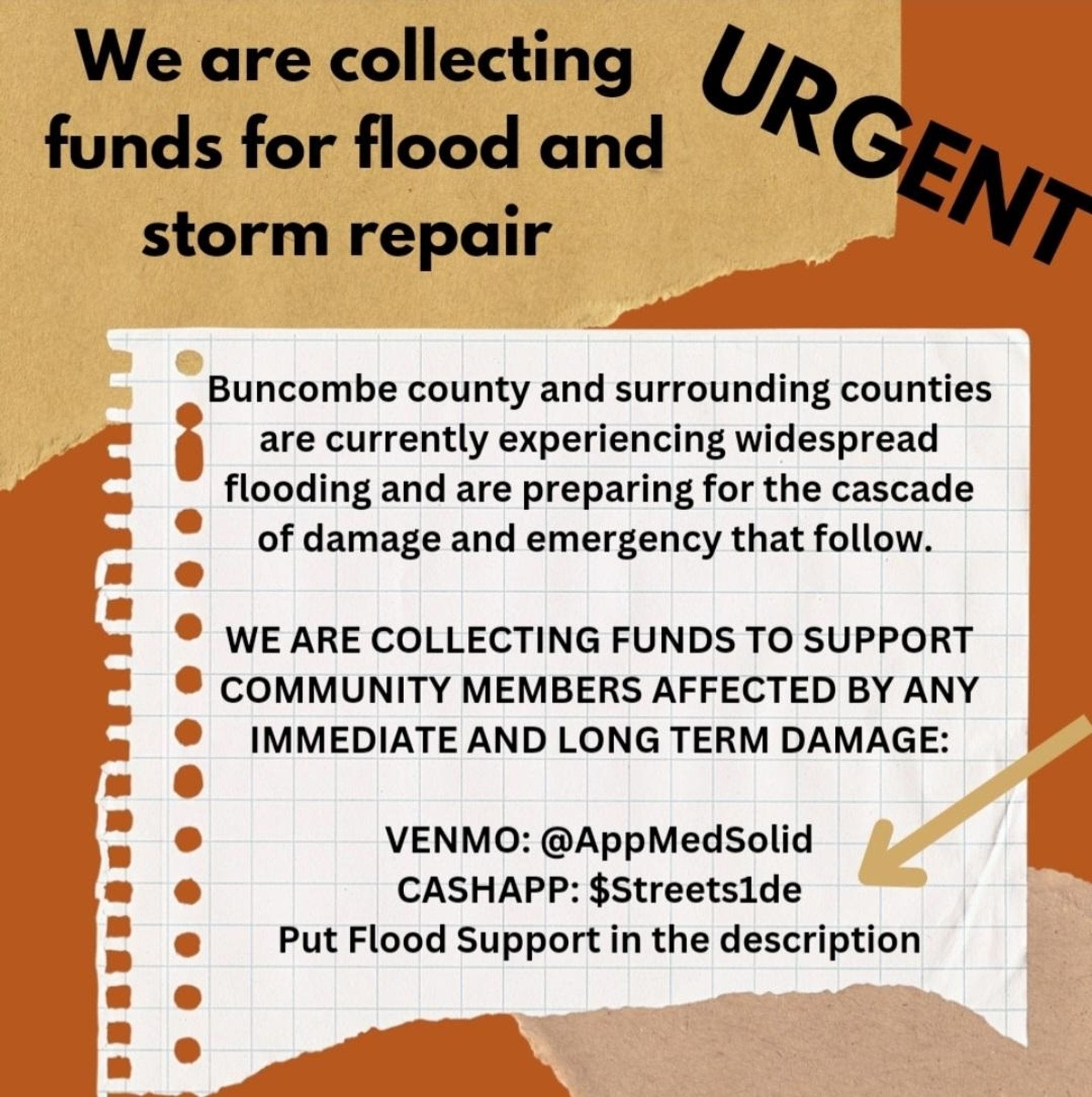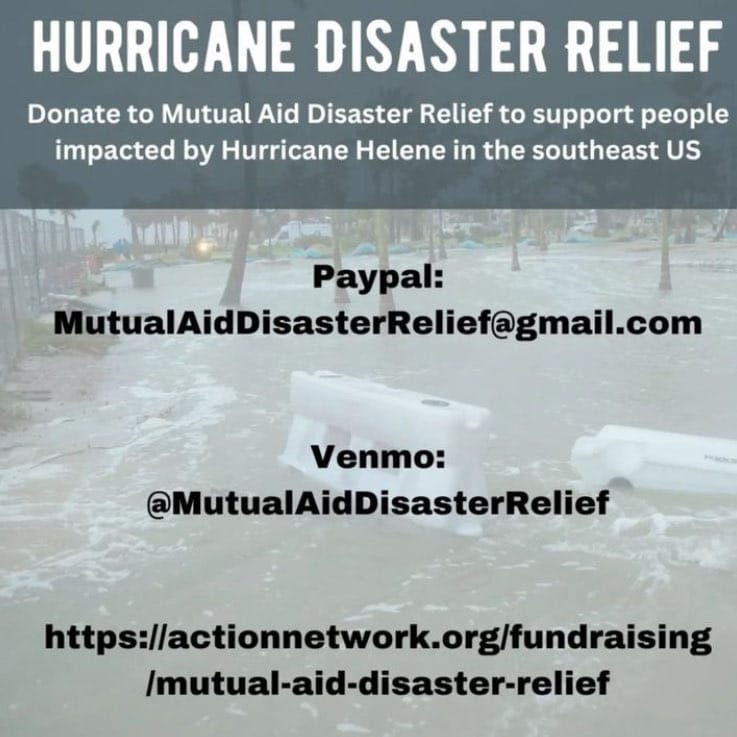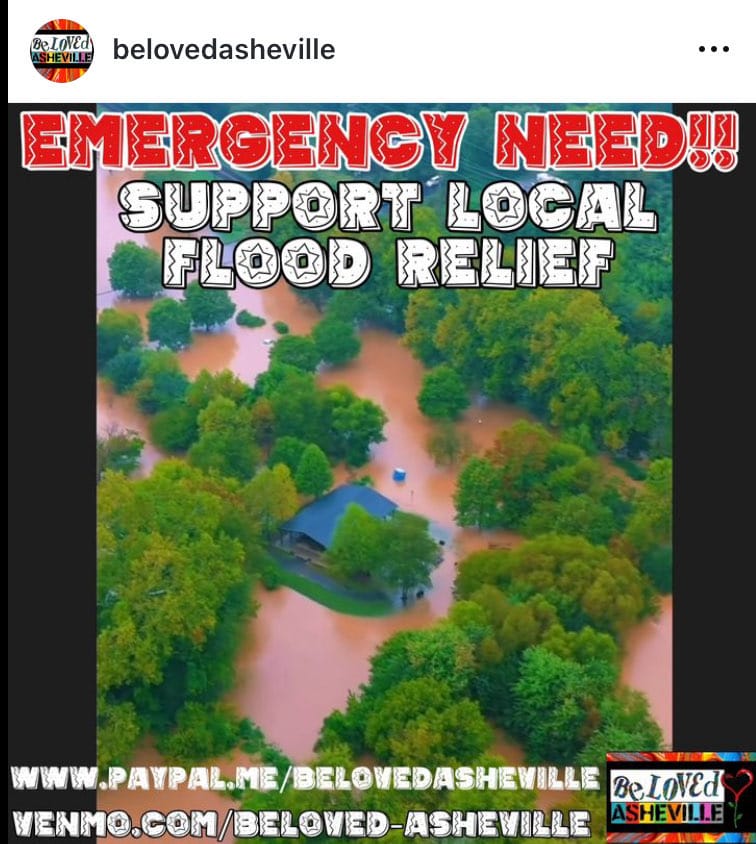All Out for the South
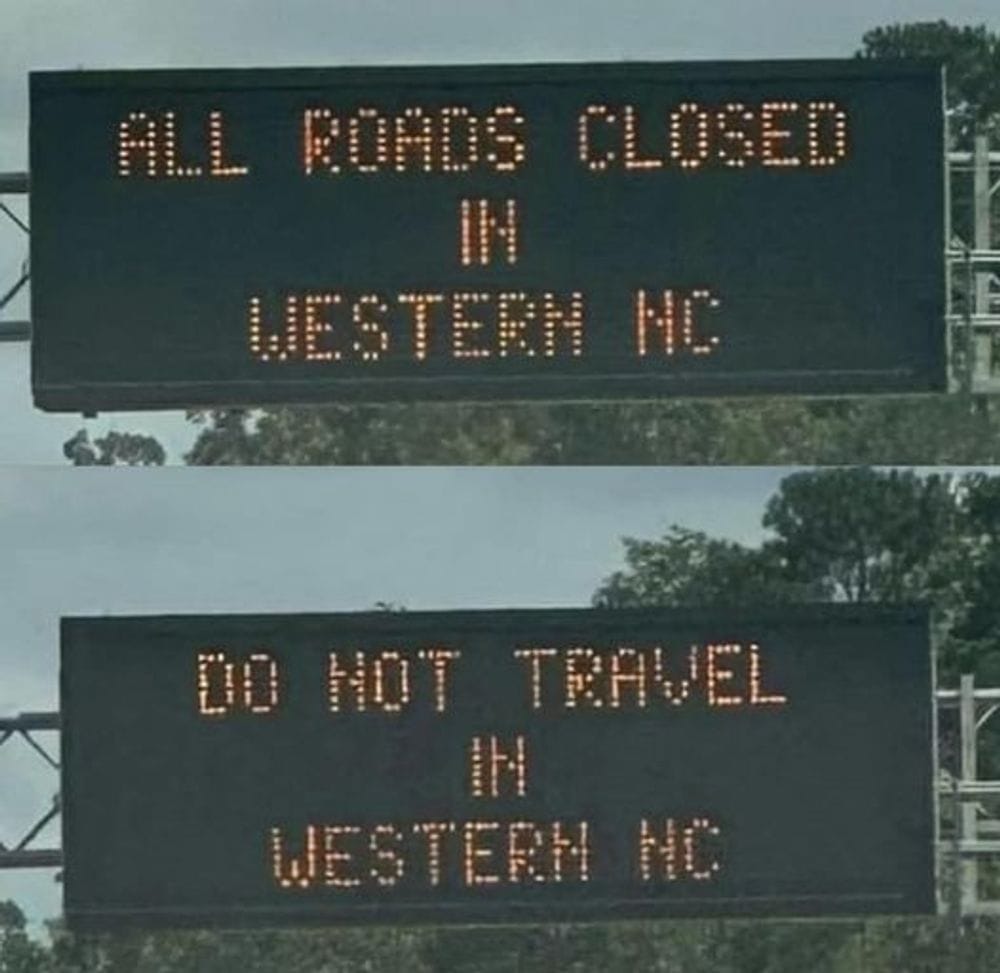
At this point, if you're in the US, you've probably heard about the devastation wreaked by Hurricane Helene. Helene was both a horrible storm and a terrifying harbinger, because it went from tropical storm to CAT 4 hurricane within 36 hours, picking up unprecedented strength and size due to water in the Gulf of Mexico being almost 2 degrees warmer than used to be usual this time of year. Helene struck land dead center in the Florida panhandle, and moved North through some of the poorest parts of the country. It is also still dumping water on Indiana as of this writing. This map of power outages shows the path of the hurricane's eye and its greatest damage.
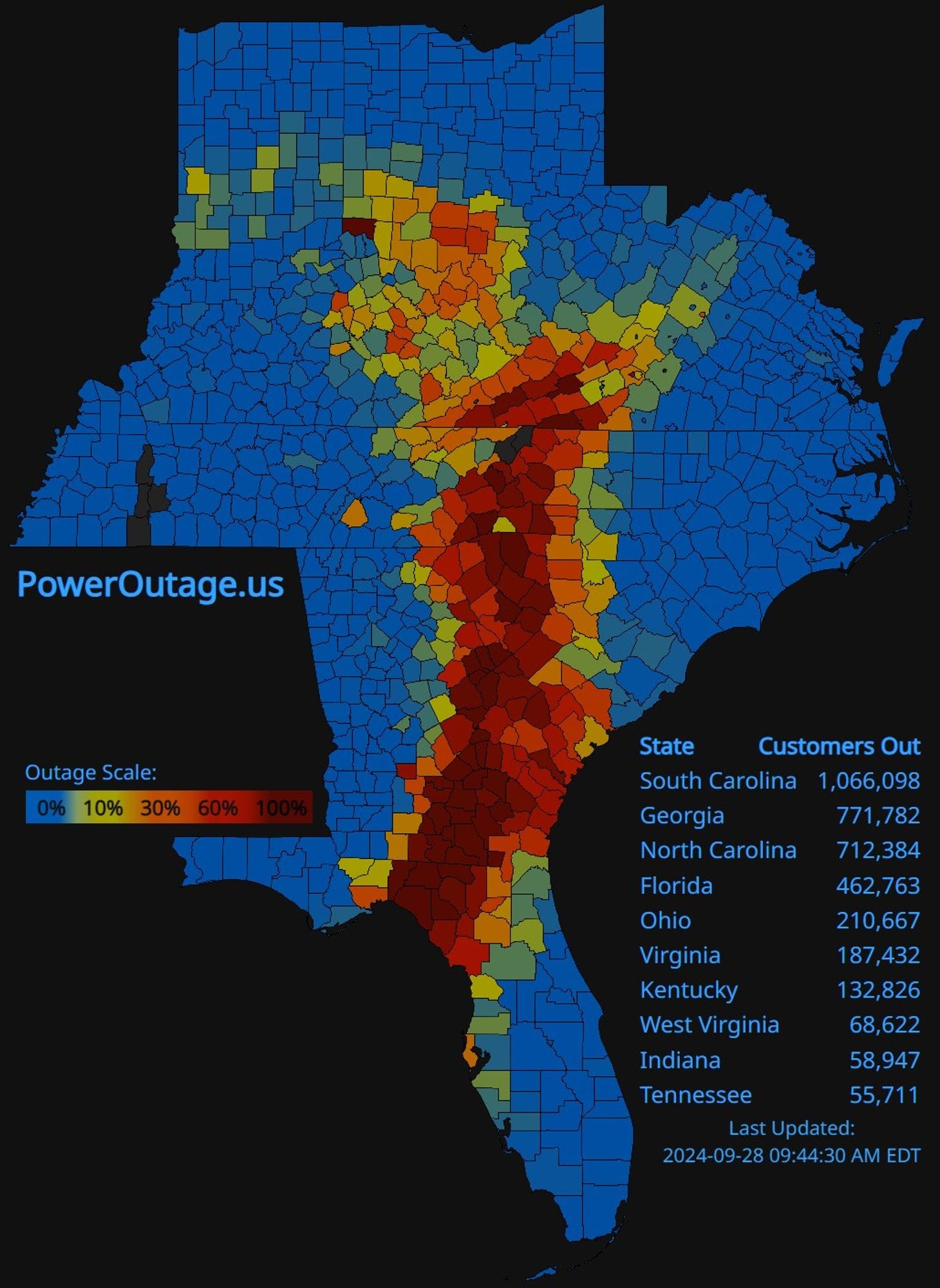
But while the winds and sea surge devastated Florida, the most intense humanitarian disaster is occurring in the Appalachian mountains, particularly around Western North Carolina. What used to be once in a century rains fell on the top of the Appalachian mountain range, creating particularly horrifying flash floods. As of this morning Asheville and the surrounding region are inaccessible except by air. As a result of these road and electricity outages, the news coming out so far has not begun to cover the destruction.
As of now, the death toll is officially at 52, although mass energy outages kill as surely as anything, and currently around 5 million people are without energy, plus the geography of life in Appalachia and the surrounding areas features relatively small and distant communities that are likely to have lost all communication. At the moment, spectacular and terrifying images are circulating to try and gesture at the destruction, such as this picture of downtown Chimney Rock, NC completely wiped out by flooding.
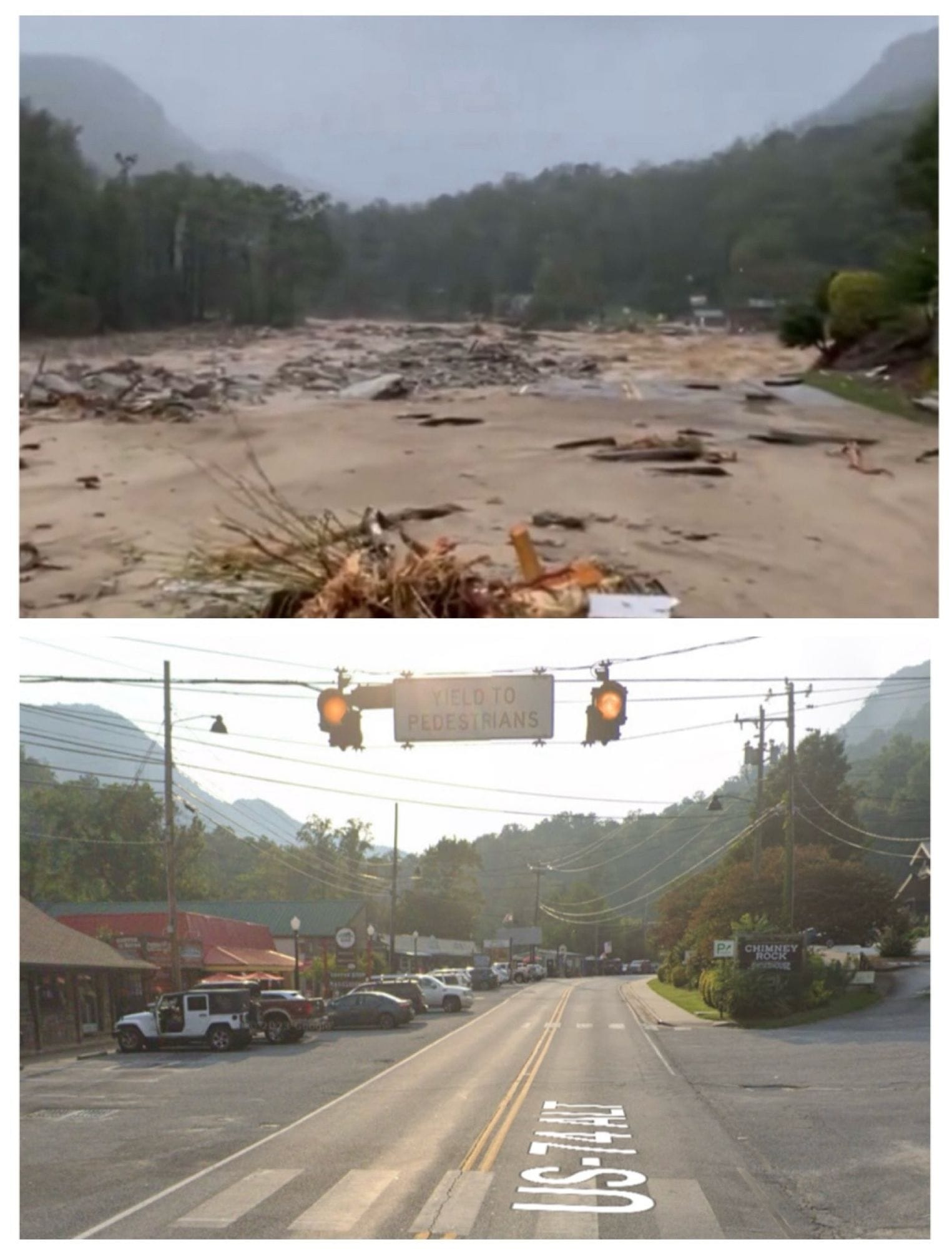
There are also images of downtown Asheville (a town that is home to many close friends) under a few feet of water. I spoke with a friend who pointed out that gentrification and development in Asheville has largely focused on the riverside area, which is in the River Swannanoa floodplain, so there was less flood absorption than there was even 10 years ago. It's not just climate change that accelerates disaster, but all forms of land exploitation, development and gentrification.
The Lake Lure dam in NC threatened to completely fail, but luckily the worst didn't happen, it "only" overspilled for hours. As of now (Saturday 9.28, 12PM) the Nolichucky Dam in Tennessee is under imminent threat of collapse, threatening three TN counties with total flash flooding.
(I want to make a quick note to people who say that people should've gotten out of the way and evacuated and have no one to blame but themselves, who pretend that these folks deserve what happens anyway, or who joke about "red states" and climate denialism getting just desserts: Fuck you, you worthless pieces of shit.)
I have a desire to compare this to previous storms, or to say this is the "highest water levels have been since" blah blah blah, but honestly, you can get that anywhere you care to look at the news.
What I want to say is that we cannot see these regional ecological crises as disconnected from us. We cannot turn our heads away and say "that's happening in the South" any more than we can ignore wild fire season in California or tornadoes in the midwest. Appalachia is "not supposed" to get drowned by hurricanes. Twenty years ago something like this would have seemed an unthinkable disaster; in 2024 it happens with a storm that builds strength in a matter of hours. These kind of disasters are more and more frequent, less and less predictable, and will only become more so as climate change accelerates.
I understand the desire to look away, to think "not my problem". In my most cowardly moments I tell myself that Philly rarely faces such extreme weather. But whats to stop another freak storm from pushing much further North than usual. Or how about how the city, with its buildings of brick and stone, could be completely leveled by an earthquake, the kind of thing that "isn't supposed to happen" in the North East but has started, slowly but surely, to occur.
Our infrastructure is built poorly, and underfunded, and even those are based on models of weather event intensity and frequency that aren't relevant anymore. Nowhere in the country is the infrastructure worse than in the South and Appalachia, but austerity, disinvestment and privatization have hit hard everywhere.
Which is to say, we are all in this together. And even if a climate disaster doesn't happen to me personally, what does that matter when so many people near me are in danger, have lost everything? There are going to be tens, maybe hundreds of thousands of displaced people from this storm, internal climate refugees in a country currently absolutely swimming in hateful anti refugee rhetoric, there are going to be rescue and rebuilding efforts on a scale that haven't been required of the people in this region before, not like this.
And so I want to ask everyone who is in any way close to the region, anyone in the north east or the mid-atlantic, folks further west, to start talking to people now about how you can help in the weeks and months to come. If you think it's just organizing a fundraiser or a clothing or supply drive, get that ball rolling now.
But donating stuff is the one aspect of help that the country at large is at least somewhat good at. Often what is needed is goods transportation, organization and distribution, as well as outreach, rebuilding, logistical assistance, offers of housing, many different short term and long term forms of help.
Think about how much time you have to give. Not many of us are in positions where we have tons of free time (which require either money or already having a life in squats, trains and the like), I know, but maybe you have a remote job that you could work from nearer a disaster zone. Maybe you're out of work right now and have a week you could spare. Maybe you just have a car and love a long drive every now and then and want to volunteer to transport people or stuff.
Odds are you know people in that huge swathe of map above, have you checked in with them? Asked them what they need, or what they're doing? They probably know about local projects and local needs, and they're probably too busy dealing with immediate questions to reach out for help. And it never hurts to tell a friend you love them and you're thinking of them.
What would you want someone to do if your house had been flooded? What would you want to see happen if you were in need of immediate help, if you felt overwhelmed and trapped? Keep an eye out for local mutual aid groups and funds in the areas effected, and watch for calls for start watching for calls-to-action or requests for assistance or need. For Asheville, pay attention to Final Straw Radio, The Asheville Blade and Firestorm Books.
At the bottom of the piece there will be some mutual aid calls that are circulating (verified by folks OTG).
There are so many ongoing catastrophes, but this is one that we can organize and move, materially and immediately, to assist. In doing so we can build long term connections and networks of care, friendships and skills, and we can model the world we want to live in. And then, when the next climate event comes for your neighborhood, maybe you will know what to do for your community, or atleast know how and who to ask for help.
The climate disasters are here, and they are going to keep coming. We must overcome the liberal regionalism of anti-south bullshit, and in doing so begin to develop more solidarity driven and internationalist perspectives.
It's not just that people need us, although they do. If we only move to address a need we'll never get beyond charity and non-profit support. We need to move and build in a way that reflects the world we want to see. In this era of unmitigating horror it can feel so odd to speak of desire or pleasure. But watching children in Gaza create beautiful gardens in their tent shelters, or turning the ruins into playgrounds leads the way in my thinking on survival.
In the face of the unbearable, the best route out is wanting something better for ourselves and the rest of the world. We are overwhelmed, we are overburdened, there is too much, too much. But there is always something we can do for one another, for ourselves and our loved ones. It may not feel like enough, but sometimes, it is everything.
